Shipping terms, Gate Term
Gate Term, loading
This Shipping Term can be used for all methods of cargo handling when the Contracting Shipper hands the goods or the container over to the Carrier by delivering them on a means of transport to a place appointed by the Carrier in the port of loading. In this Shipping Term, ’container’ means also other equivalent large-sized unit loads.
| Division of costs and risks -- Kustannusten ja riskien jakautuminen | Gate Term -- Porttiehto |
|---|---|
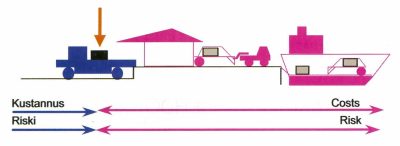 | Gate Term, loading -- Porttiehto, lastaus |
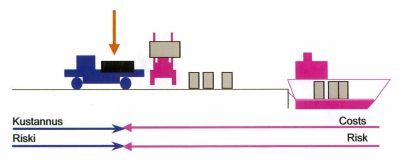 | Gate Term, loading container -- Porttiehto, kontit, lastaus |
| Gate Term, loading: The Contracting Shipper | Gate Term, loading: The Carrier |
|---|---|
1 Delivering the goods to the Carrier The Contracting Shipper delivers the goods or the container to the unloading place named by the Carrier in the port of loading at the time agreed. | 2 Taking delivery of the goods from the Contracting Shipper The Carrier takes delivery of the goods or the container from the Contracting Shipper at the unloading point named by the Carrier in the port of loading at the time agreed, and unloads them from the means of transport which has arrived. |
3 Division of costs The Contracting Shipper bears all costs of delivering the goods or the container in accordance with 1. | 4 Division of costs The Carrier bears all costs of taking delivery of the goods or the container and of their carriage after he has received them in accordance with 2. |
5 Division of liability The Contracting Shipper bears all liability for loss of or damage to the goods or the container until he has handed them over in accordance with 1. | 6 Division of liability The Carrier bears all liability for loss of or damage to the goods or the container after he has received them in accordance with 2. |
7 Other obligations The Contracting Shipper must provide suitable packing for the goods, mark the goods or the container and load them so that they can be handled in a normal way and be identified as the contract goods. | 8 Other obligations The Carrier must give the Contracting Shipper, in due time, notice as to when the goods or the container must be at the place for the Carrier to take delivery. |
Gate Term, discharge
This Shipping Term can be used for all methods of cargo handling when the Carrier hands the goods over to the Consignee in the port of discharge either directly from the warehouse or by loading it from the warehouse onto the Consignee’s means of transport. This Shipping Term can be used also when the Carrier hands the loaded container over to the Consignee in the port of discharge by loading the container from the warehouse onto the Consignee’s means of transport. In this Term, ’container’ means also other large-sized unit loads.
| Division of costs and risks -- Kustannusten ja riskien jakautuminen | Gate Term -- Porttiehto |
|---|---|
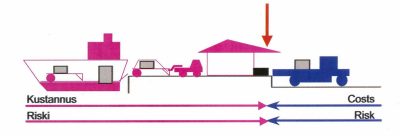 | Gate Term, discharge -- Porttiehto, purkaus |
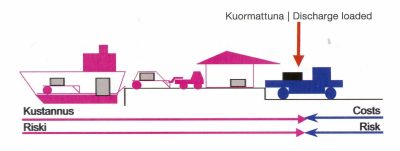 | Gate Term, discharge, loaded -- Porttiehto, purkaus kuormattuna |
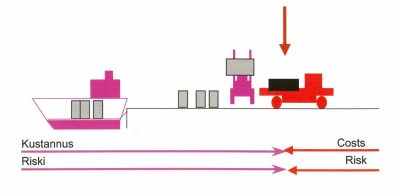 | Gate Term, discharge, container -- Porttiehto, kontit, purkaus |
| Gate Term, discharge: The Carrier | Gate Term, discharge: The Consignee |
|---|---|
1 Delivering the goods to the Consignee The Carrier delivers the goods to the Consignee at the time stipulated
The Carrier delivers the container, at the time stipulated, loaded on a means of transport named by the Consignee in the agreed place. The Carrier hands over the goods when he, within the period stipulated,
or,
The Carrier hands over the container when he loads it on a means of transport within the period stipulated. | 2 Taking delivery of the goods from the Carrier The Consignee takes delivery of the goods from the Carrier at the time stipulated
or, when the parties have so agreed,
The Consignee takes delivery of the container loaded on a means of transport named by him in the agreed place at the time stipulated. The Consignee receives of the goods when they are, within the period stipulated,
or
The Consignee receives of the container when it is loaded on a means of transport within the period stipulated. |
3 Division of costs The Carrier bears all costs of delivering the goods or the container in accordance with 1, including storage within the agreed free time and delivery. Should the Carrier fail to deliver the goods or the container in accordance with 1 or should he fail to fulfil the obligations defined in 7, he is liable for all direct costs thereby incurred to the Consignee. | 4 Division of costs The Consignee bears the costs of handling and carrying the goods or the container after he has received them in accordance with 2. These costs include, among other things, port dues on goods, checking the goods, counting them and fastening them on the means of transport, and other activities consequent to the above. Should the Consignee fail to take delivery of the goods or the container in accordance with 2 or should he fail to fulfil the obligations defined in 8, he is liable for all direct costs thereby incurred to the Carrier. |
5 Division of liability The Carrier bears all liability for loss of or damage to the goods or the container until he has handed them over in accordance with 1. | 6 Division of liability The Consignee bears all liability for loss of or damage to the goods or the container after he has received them in accordance with 2. Should the Consignee fail to take delivery of the goods or the container in accordance with 2, he bears all liability for loss of or damage, thereby incurred, to the goods or the container |
7 Other obligations The Carrier must give the information necessary for taking delivery of the goods or the container in due time before the delivery. The information must be given to the person named by the Contracting Shipper. If the Carrier is unable to give this information to the named person, he can give it to the owner of the cargo, or, if he does not know who is the owner, to the Contracting Shipper. The Carrier must indicate the loading point to the person defined in this paragraph and give him notice as to when the goods can be loaded on a means of transport there. | 8 Other obligations The Consignee must seek the information relating to the delivery of the goods or the container, defined in 7, from the Carrier in due time. The Consignee must give, in due time, the Carrier, notice of any special requirements relating to the order or manner of delivering the goods. The Consignee bears all additional costs incurred directly because of these requirements. |